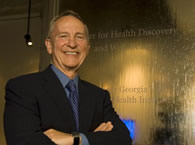News Release: School of Medicine, School of Public Health
Nov. 18, 2008
Burroughs Wellcome Fund Award Creates New PhD Path Linking Laboratory and Population Sciences
 Kenneth Brigham, MD
Kenneth Brigham, MDThe Burroughs Wellcome Fund (BWF) has selected Emory University for a $2.5 million, five-year award aimed at training new biomedical scientists whose expertise in research and teaching will bridge laboratory and population sciences.
The Emory program is one of three new BWF programs funded nationally within the Institutional Program Unifying Population and Laboratory Based Sciences. The other two programs will be located at the University of California, Los Angeles (metabolic diseases) and the University of Texas, Houston Health Science Center (gene-environment interaction).
The training awards, focused on understanding and improving human health, were created to connect population and computational sciences with laboratory-based biological sciences. The goal is to establish training programs that partner researchers in schools of medicine with those in schools of public health, as well as with a diverse range of other partners.
Emory's program, housed within the Emory University Graduate School, will create a new doctoral pathway called Human Health: Molecules to Mankind (M2M), with the theme of "Understanding human health: integrating biology, behaviors, environments and populations." Each doctoral student will train within two existing PhD programs, one in a laboratory science and one in a population science.
Kenneth Brigham, MD, director of the Emory/Georgia Tech Predictive Health Institute, will direct the M2M program with Michele Marcus, PhD, director of graduate studies and professor in the Department of Epidemiology at Emory's Rollins School of Public Health.
"The M2M program will create a bridge between these two areas of laboratory and population sciences, with the goal of creating a new kind of biomedical scientist," says Brigham. "With Emory's emphasis on cross-disciplinary education and research, and with a strategic plan that includes predictive health, global health, and computational and life sciences, our university is ideally positioned to become fully engaged in this pioneering program with our students and faculty."
Students will enroll in the Emory Graduate School and will align with existing PhD programs or with a new proposed PhD program in predictive health in Emory School of Medicine and the Rollins School of Public Health. Emory College will be a key participant, along with collaborators at the Centers for Disease Control and Prevention and the Georgia Institute of Technology. A collaboration with the Atlanta Clinical and Translational Science Institute also involves the Morehouse School of Medicine, Kaiser Permanente of Georgia and Children's Healthcare of Atlanta.
Lisa A. Tedesco, PhD, dean of the Graduate School, is excited about the project. "The M2M program brings together faculty and resources from many areas to train a new generation of scientists who can approach biomedical research with a new level of comprehensive and interconnected skill and expertise," she says. "It is an excellent example of reconfiguring graduate education to address difficult problems at a new level, and we are pleased to be a part of it."
Emory and partner institutions will provide an extensive background of related research projects, partnerships, and research and educational infrastructure that will enrich the new M2M training program. These include, among others, the Emory/Georgia Tech Predictive Health Institute, Emory Global Health Institute, the Hubert Department of Global Health and the Department of Epidemiology in the Rollins School of Public Health, the Emory Graduate Division of Biological and Biomedical Sciences, the joint Coulter Department of Biomedical Engineering at Georgia Tech and Emory, and the Emory-led Atlanta Clinical and Translational Science Institute (ACTSI).
The program initially will include four tracks, although others could be included as the program develops:
- Predictive Health, led by Kenneth Brigham, MD, associate vice president of predictive health and professor of medicine, Emory School of Medicine, and Michelle Lampl, MD, PhD, professor of anthropology, Emory College.
- Population Processes and Dynamics of Infectious Diseases, led by Bruce Levin, PhD, professor of biology, Emory College, and David Stephens, MD, vice president for research, Woodruff Health Sciences Center and director, Division of Infectious Diseases, Emory School of Medicine.
- Biomarkers and the Development of Acute and Chronic Diseases, led by K.M. Venkat Narayan, MD, MBA, Hubert professor of global health, Rollins School of Public Health, and Peter Wilson, MD, professor of medicine, Emory School of Medicine.
- Public Health Genomics: Genetic and Environmental Determinants of Health, led by Michele Marcus, PhD, professor of epidemiology, Rollins School of Public Health and Stephanie Sherman, PhD, professor of human genetics, Emory School of Medicine.
The M2M program also will offer an elective global science experience through the Emory Global Health Institute, the CDC and existing Emory collaborative programs in a variety of countries.
According to the Burroughs Wellcome Fund, trainees of its new programs may bring "new approaches to combining genomics with phenomics, addressing questions of population genetics, understanding molecular and environmental epidemiology, and a range of other issues important to understanding human health and its disruptors."
###
The Robert W. Woodruff Health Sciences Center of Emory University is an academic health science and service center focused on missions of teaching, research, health care and public service. Its components include schools of medicine, nursing, and public health; Yerkes National Primate Research Center; the Emory Winship Cancer Institute; and Emory Healthcare, the largest, most comprehensive health system in Georgia. The Woodruff Health Sciences Center has a $2.3 billion budget, 17,000 employees, 2,300 full-time and 1,900 affiliated faculty, 4,300 students and trainees, and a $4.9 billion economic impact on metro Atlanta.
Learn more about Emory’s health sciences:
Blog: http://emoryhealthblog.com
Twitter: @emoryhealthsci
Web: http://emoryhealthsciences.org
